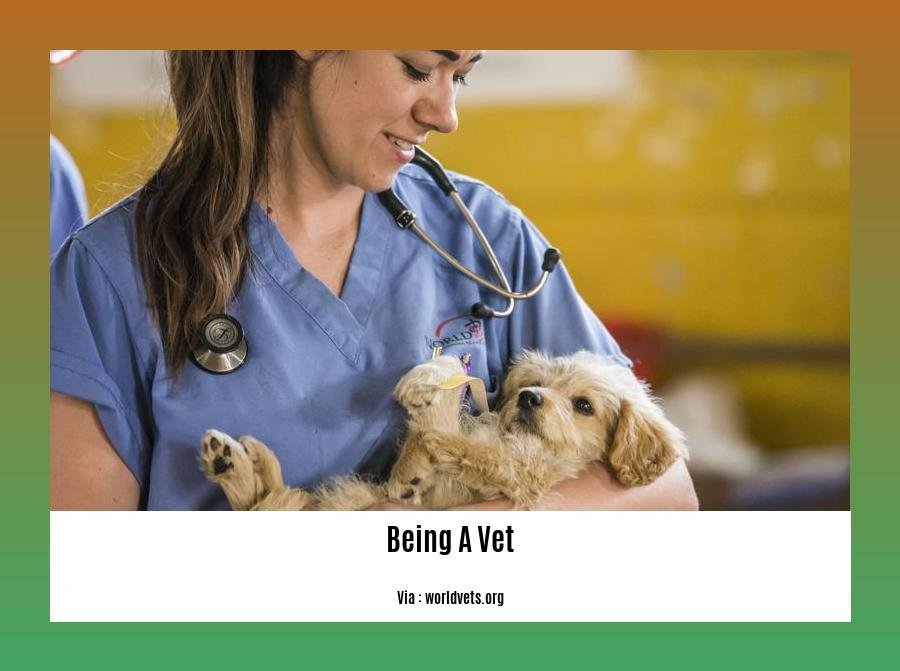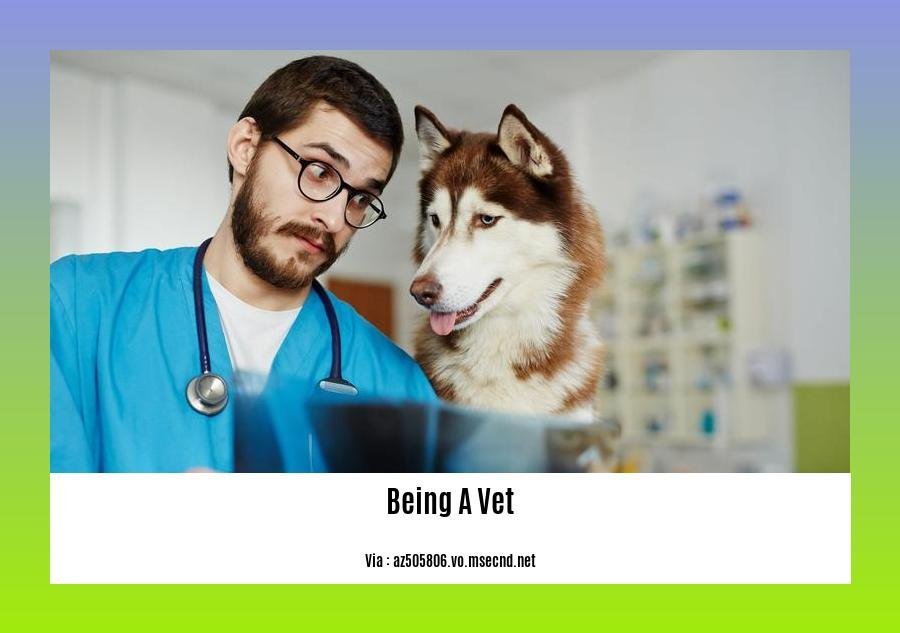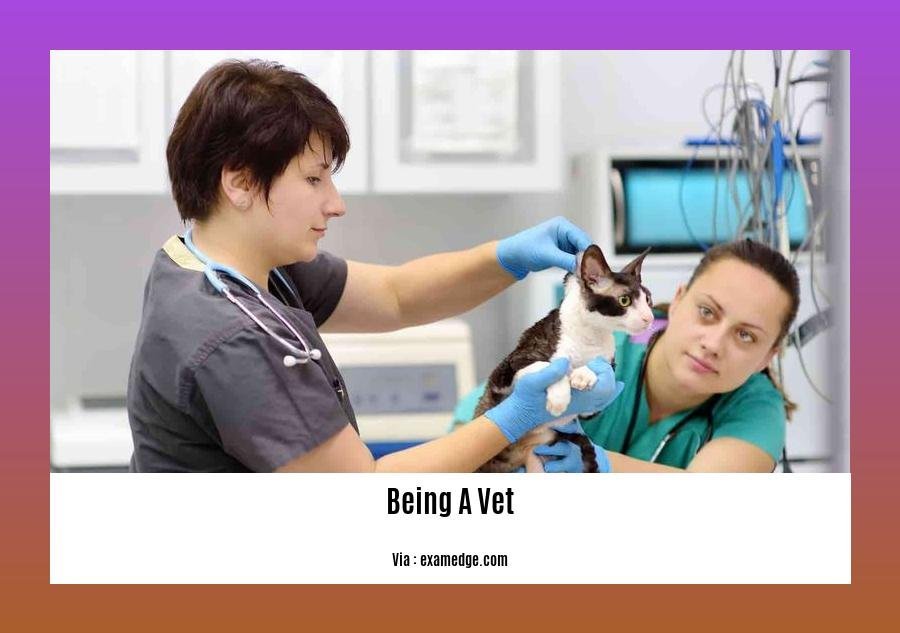Explore the fascinating world of veterinary medicine with “Cool Facts About Being a Vet: Exploring the Fascinating World of Veterinary Medicine.” In this article, we uncover 10 interesting facts about veterinarians, highlighting the cool things about being a veterinarian and the important facts that make this profession unique. Learn about the tough environments vets have to work in and discover the captivating aspects of working with animals as a highly skilled veterinary professional.
Key Takeaways:
– The term veterinarian is derived from the Latin word “veterinae,” meaning ‘working animals’.
– Dogs are the most common animals treated by veterinarians, with 46.3 million households in the US owning a dog.
– The veterinary profession is predominantly female, with almost 80% of practicing veterinarians being women.
– Veterinarians must specialize in a particular area of veterinary medicine.
– 61% of human diseases originated from animals.
– Veterinarians often work long and unpredictable hours, being on call and dealing with scared or aggressive animals.
– Vets must take precautions to avoid getting injured by animals they treat.
– Comforting families who have sick or dying pets can be emotionally challenging for veterinarians.
– Working as a veterinarian often involves a noisy environment and long hours, with on-call duties.
– Veterinarians often encounter demanding and emotional pet owners.
Cool Facts About Being a Vet: Exploring the Fascinating World of Veterinary Medicine

The Rich History and Meaning Behind the Term “Veterinarian”
Did you know that the word “veterinarian” originates from the Latin term “veterinae,” which means ‘working animals’? This insightful bit of trivia reveals the long-standing connection between veterinarians and their dedication to caring for animals that play crucial roles in our lives.
Dogs: Beloved Companions and Common Visitors
When it comes to the patients that grace veterinary exam tables, dogs take the lead. As man’s best friend, it’s no surprise that these loyal creatures hold the top spot. In fact, in the United States alone, a staggering 46.3 million households consider dogs as cherished family members.
Women Pioneering in Veterinary Medicine
While gender should never define expertise, it’s fascinating to note that nearly 80% of practicing veterinarians are females. These dedicated women are breaking barriers, contributing significantly to the advancement of the field and providing exceptional care to countless animals.
Delving into Specialization
Just like human doctors, all veterinarians must pursue a specialty. This specialization allows them to focus their expertise and provide specialized care in areas such as surgery, internal medicine, dermatology, or ophthalmology—ensuring our beloved animals receive the best possible treatment.
The Intertwined Nature of Animal and Human Health
Did you know that a significant portion of human diseases initially stem from animals? Research suggests that a staggering 61% of all human diseases have their origins in animals. The close interaction between veterinary medicine and human health underscores the vital role that veterinarians play in safeguarding both animal and human well-being.
The Round-the-Clock Commitment
Being a vet is no 9-to-5 job. Veterinarians often find themselves on-call around the clock, tackling emergency cases and providing critical care outside regular working hours. Their dedication ensures that animals receive the timely attention they deserve, even in the darkest hours of the night.
Navigating the Challenges of Dealing with Animals
Working with animals is a rewarding experience, but it also comes with certain risks. Veterinarians frequently encounter scared, dangerous, or aggressive animals as part of their job. They must remain cautious to avoid being kicked, scratched, or bitten—navigating these challenges while still delivering compassionate care requires exceptional skill and experience.
The Emotional Toll of Comforting Families
One of the most difficult aspects of being a veterinarian is providing comfort and support to families whose beloved pets are sick or nearing the end of their lives. Veterinarians understand the deep bond between animals and their owners, and they play an essential role in offering solace during these challenging times.
The Vibrant Atmosphere of Veterinary Clinics
Veterinarians work in a lively and bustling environment, surrounded by the sounds of purrs, barks, and chirps. The clinic atmosphere often reflects the love and care poured into every patient’s well-being. While it can be noisy, it’s a testament to the dedication of veterinary professionals who always strive to create a nurturing space for both animals and owners.
Collaborative Care and On-Call Duties
In group practice settings, veterinarians take turns being on call at night or on the weekends. This collaborative approach ensures that animals in need receive timely care, regardless of the hour. Conversely, those in private solo practices may have to dedicate longer hours, including working on the weekends. These commitments demonstrate the unwavering dedication of vets across various practice setups.
The Human Element: Emotions and Expectations
Veterinarians not only provide medical care to animals but also frequently navigate the emotional landscape of pet ownership. Dealing with emotional and demanding pet owners is a common occurrence. These empathetic professionals must patiently address concerns, educate owners, and forge positive relationships to deliver the best care possible.
As a veterinarian, the journey is as challenging as it is rewarding. You are entrusted with the well-being of our cherished animal companions and play a fundamental role in the intricate web of human-animal health. Each day brings new encounters and opportunities to witness the incredible healing powers of animals firsthand. Embrace the cool facts about being a vet, and revel in the awe-inspiring world of veterinary medicine!
Check out these cool facts about Indianapolis! From its world-famous Motor Speedway to its vibrant arts scene, this city is full of surprises. Discover all there is to know about the Circle City and its rich history.
Did you know that marine biology offers a window into a whole new underwater world? Explore fascinating facts about marine creatures, their habitats, and the important role they play in our ecosystem. Dive in and be mesmerized by the wonders of the ocean!
Prepare to be enchanted by the enchanting beauty of Prince Edward Island. From its stunning red sand beaches to its charming lighthouses, this island paradise is a haven for nature lovers. Uncover intriguing facts about its history, culture, and breathtaking landscapes. Get ready to escape to this Canadian gem!
Important Facts About Being a Veterinarian

As an experienced veterinarian, I have gathered a wealth of knowledge and insights about the fascinating world of veterinary medicine. If you’re curious about what it’s really like to be a veterinarian, then you’re in for a treat. Here are some important facts that shed light on this amazing profession.
1. Extensive Training and Education
Becoming a veterinarian requires dedication and a love for learning. Veterinarians typically spend 8 to 12 years in education, including undergraduate studies and veterinary school. This extensive training equips them with the knowledge and skills needed to provide comprehensive care to a wide range of animals.
2. Diverse Career Opportunities
Contrary to popular belief, veterinarians don’t just treat dogs and cats. While caring for beloved pets is a significant part of their work, veterinarians also provide care for a variety of animals such as birds, ferrets, rabbits, and even livestock animals like horses, goats, and sheep. Moreover, within the field of veterinary medicine, there are numerous specializations to choose from, allowing vets to focus their expertise on specific areas such as exotic animal medicine, emergency and critical care, dermatology, and surgery, among others. This diversity of career opportunities ensures that every veterinarian can find their niche and make a significant impact.
3. The Healing Power of Animals
One of the most awe-inspiring aspects of being a veterinarian is witnessing the incredible healing powers of animals. Animals have an extraordinary ability to recover and bounce back from illness and injury with the right care and treatment. As a veterinarian, it is deeply gratifying to be able to facilitate this healing process and witness the resilience and strength of the animals we care for.
4. Collaborative Work Environment
Veterinary medicine is not a solitary profession. Veterinarians often work closely with a team of dedicated colleagues, including veterinary technicians, nurses, and assistants. This collaborative work environment allows for the exchange of knowledge and ideas, ensuring that the best possible care is provided to each animal.
5. Impact on Animal Lives and Their Owners
Being a veterinarian goes beyond just treating animals. It involves building relationships with the pet owners and making a lasting impact on both the lives of animals and their grateful owners. Veterinarians play a crucial role in educating pet owners about preventive care, diagnosing and treating illnesses, and helping pets live long and healthy lives.
6. Adaptable and Quick-Thinking
Working with animals can be unpredictable, and every day brings new challenges. Veterinarians must be adaptable and quick-thinking in order to provide the best care for their patients. Whether it’s dealing with scared or aggressive animals, performing emergency procedures, or making difficult decisions, veterinarians need to think on their feet and remain calm under pressure.
7. Strong Communication Skills
Communication is a key aspect of being a veterinarian. It’s not just about treating animals; it also involves effectively communicating with pet owners to explain diagnoses, treatment plans, and preventive care measures. Veterinarians must be able to connect with both animal owners and their colleagues to ensure the best outcomes for their patients.
8. Financial Rewards and Work Environment
While being a veterinarian can be financially rewarding, with some earning more than $90,000 a year, it’s important to note that the profession often entails demanding work environments. Veterinarians may work long hours, including nights and weekends, and must be prepared to handle unexpected situations. It’s not uncommon for them to deal with emotional pet owners and work in noisy, challenging environments. However, the rewards of making a positive impact on animal lives outweigh these challenges.
Now that you’ve learned some important facts about being a veterinarian, you have a better understanding of the unique and fascinating world of veterinary medicine.
Key Takeaways:
- Veterinarians undergo extensive training and education, typically spending 8 to 12 years in education.
- They have diverse career opportunities, including caring for a variety of animals and specializing in various areas of veterinary medicine.
- Veterinarians have the privilege of witnessing the incredible healing powers of animals.
- Collaborative work environments allow for the exchange of knowledge and ideas among veterinary professionals.
- Effective communication with both animal owners and colleagues is a crucial skill for veterinarians.
- Being a veterinarian requires adaptability and quick thinking in unpredictable situations.
- While financially rewarding, the profession may involve long hours, challenging work environments, and emotional demands.
Sources:
1. Pet Keen: “115 Interesting Veterinarian Statistics” (source: petkeen.com/veterinarian-statistics)
2. Career Trend: “10 Most Important Facts About Vets” (source: careertrend.com/13373654/10-most-important-facts)
3- Vets Have To Work In Tough Environment
Being a veterinarian is not all cuddling puppies and giving belly rubs. In fact, veterinarians have to work in a tough environment that poses various challenges and demands. From dealing with demanding pet owners to working long hours in a noisy clinic, the veterinary profession requires individuals who are dedicated, resilient, and adaptable.
Challenging Work Environments
One of the toughest aspects of being a vet is the demanding work environment. Veterinary clinics can be bustling, noisy places where animals and their owners come seeking medical care. Vets often have to handle unpredictable situations, such as frightened or aggressive animals. This requires them to stay calm, focused, and quick on their feet to ensure the safety of themselves and their team.
Physical Demands
Working with animals can be physically demanding, and veterinarians need to be cautious to avoid getting kicked, scratched, or bitten. Animals can become anxious or defensive during medical procedures, and vets must handle them with care while ensuring their own safety. It takes a combination of skill, experience, and an understanding of animal behavior to navigate these potentially hazardous situations.
Emotional Challenges
Veterinarians don’t just treat animals; they also provide support and empathy to pet owners during difficult times. Comforting families whose beloved pets are sick or dying can be emotionally challenging. Vets witness the deep bond between animals and their owners and often share in their grief. It requires immense compassion and emotional resilience to navigate these heart-wrenching moments and provide comfort to grieving families.
Stress and Work-Life Balance
Veterinary medicine can be a high-stress profession. Long hours, emergency on-call shifts, and the pressure to make critical medical decisions can take a toll on a veterinarian’s well-being. It is crucial for vets to prioritize self-care and strike a healthy work-life balance to maintain career satisfaction and prevent burnout. Stress management techniques, support from colleagues, and a supportive work environment are essential to mitigate the challenges of this demanding profession.
Key Takeaways:
- Veterinarians work in challenging environments that require them to handle unpredictable situations and demanding pet owners.
- Physical demands are involved in working with animals, and vets need to ensure their safety while providing care.
- Providing support to grieving pet owners is an emotionally challenging aspect of being a vet.
- Stress management and maintaining a healthy work-life balance are crucial for veterinarian well-being.
Sources:
– Learn more about vets’ work environment at indevets.com blog
– Source: Career Explorer | Veterinarian Career Information, Job Description, and Duties
– Source: Fun Facts about Veterinarians
FAQ
Q1: What are some cool things about being a veterinarian?
A1: Some cool things about being a veterinarian include witnessing the incredible healing powers of animals, collaborating with dedicated colleagues, and making a lasting impact on both the lives of animals and their grateful owners.
Q2: How long does it take to become a veterinarian?
A2: Typically, aspiring veterinarians spend 8 to 12 years in education to become a veterinarian. This includes completing veterinary school after obtaining a Bachelor’s degree.
Q3: Do veterinarians only treat dogs and cats?
A3: While most veterinarians specialize in caring for dogs and cats, they also provide care for other common pets such as birds, ferrets, and rabbits. Additionally, some veterinarians work in private mixed practices and provide care for livestock animals like goats, sheep, cattle, horses, and pigs.
Q4: What specialties are available in the field of veterinary medicine?
A4: Veterinarians can choose to specialize in various areas such as exotic animal medicine, emergency and critical care, dermatology, surgery, and many more. This allows them to focus their expertise and provide specialized care for animals in need.
Q5: Is being a veterinarian financially rewarding?
A5: Being a veterinarian can be financially rewarding for some. While earnings vary, some veterinarians can earn more than $90,000 a year. However, it is important to note that veterinarians often face tough work environments and working with animals can be unpredictable.
















